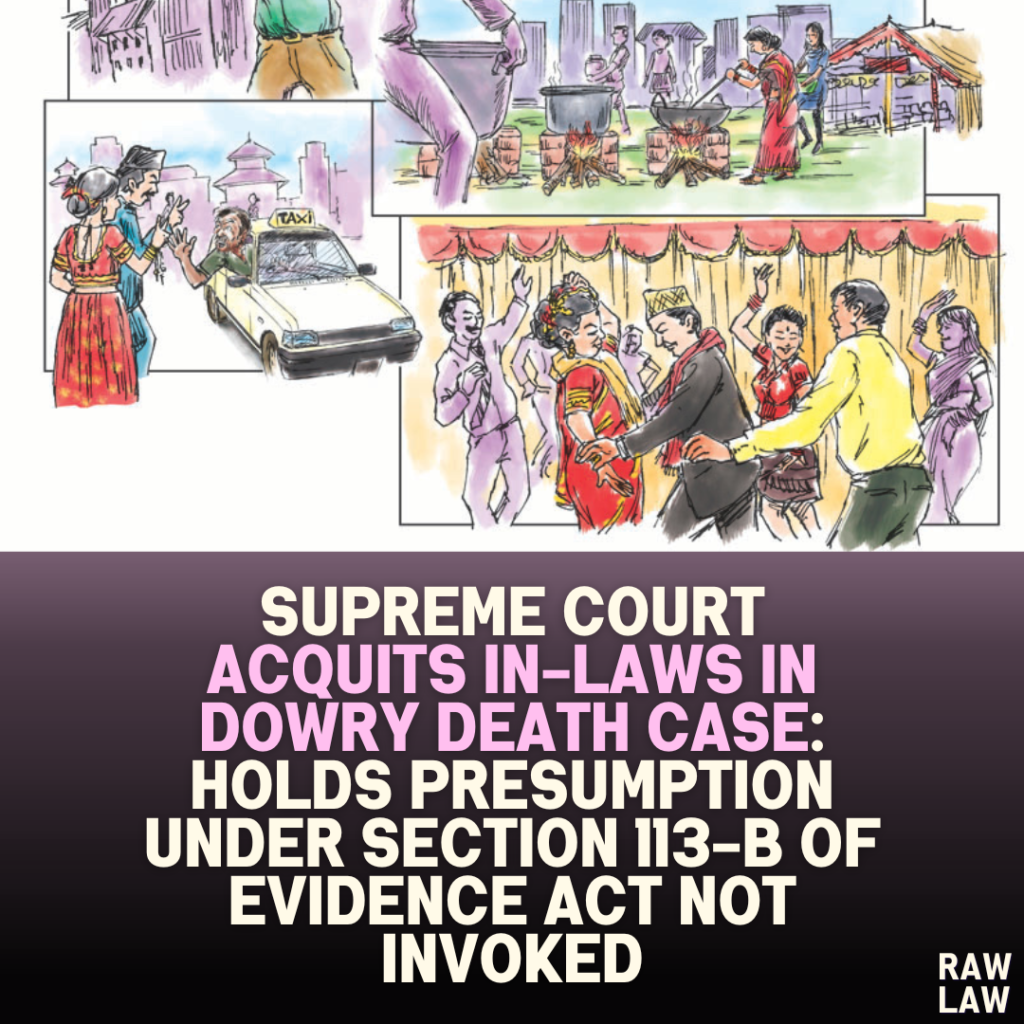Court’s Decision: The Supreme Court allowed the appeal, acquitting the appellants of charges under Sections 304-B and 498-A IPC. The Court found that the essential elements required to prove a dowry death had not been established beyond a reasonable doubt. The appellants, who had been convicted for dowry death and cruelty by the lower courts, had their sentences set aside, and their bail bonds were discharged.
Facts: The case revolved around the unnatural death of a woman who died of burn injuries at her matrimonial home within seven years of her marriage. The deceased’s father and mother alleged that the appellants, who were the deceased’s in-laws, had demanded a motorcycle and cash during the naming ceremony of the deceased’s child. They claimed that the deceased had expressed fear for her life if the demand was not fulfilled. The trial court convicted the appellants, and the High Court reduced their sentences. The appeal in the Supreme Court was filed by the appellants challenging their conviction.
Issues:
- Whether the deceased was subjected to cruelty or harassment by the appellants soon before her death in connection with dowry demands.
- Whether the necessary ingredients to establish a dowry death under Section 304-B IPC were satisfied.
Petitioner’s Arguments:
The appellants argued that the deceased committed suicide due to reasons unrelated to dowry demands, including her separation from her husband, who was residing elsewhere due to his job, and her depression over a discovered photograph of her with a stranger.
They contended that there was no direct evidence of dowry demand or harassment, and the testimonies of the deceased’s parents lacked consistency.
Respondent’s Arguments:
The State argued that the deceased had informed her parents about the dowry demand and threats prior to her death, which were admissible as evidence under Section 32(1) of the Evidence Act.
It was submitted that the appellants, being the deceased’s in-laws, were responsible for her harassment, leading to her dowry death.
Analysis of the Law: To constitute a dowry death under Section 304-B IPC, four elements must be satisfied:
- The death must occur by burns or injury or under unnatural circumstances.
- It must occur within seven years of marriage.
- The woman must have been subjected to cruelty or harassment soon before her death.
- Such cruelty or harassment must be in connection with a dowry demand.
The Court emphasized that while the death was unnatural and occurred within seven years of marriage, the evidence failed to establish that the deceased was harassed soon before her death in connection with a dowry demand.
Precedent Analysis: The Court referred to the legal standards required to raise the presumption under Section 113-B of the Evidence Act, which provides for a presumption of dowry death if cruelty related to dowry is proven soon before the death. In this case, the presumption could not be applied as the ingredients for dowry death were not satisfactorily proved.
Court’s Reasoning: The Court found significant inconsistencies in the testimonies of the deceased’s parents, particularly regarding their inaction in confronting the alleged dowry demand, which they claimed to have treated as a joke. The Court also noted that no dowry demand had been raised at the time of marriage, and the alleged demand arose only after the birth of the child, which weakened the prosecution’s case. Furthermore, no independent witnesses supported the prosecution’s allegations. The Court determined that there was reasonable doubt regarding the harassment for dowry.
Conclusion: The appeal was allowed, and the conviction of the appellants was set aside. The Court held that the evidence did not prove the appellants’ guilt beyond reasonable doubt, and the presumption under Section 113-B of the Evidence Act could not be invoked.
Implications: This ruling emphasizes the importance of concrete evidence in cases of dowry death, particularly the requirement to prove dowry harassment “soon before” the death. It sets a significant precedent that courts must carefully evaluate witness testimonies and surrounding circumstances before presuming dowry harassment. The judgment underscores that allegations alone, without reliable supporting evidence, may not be sufficient to secure a conviction in dowry death cases. This decision may influence how dowry death cases are handled, particularly with regard to the burden of proof on the prosecution to establish all essential ingredients beyond a reasonable doubt.
